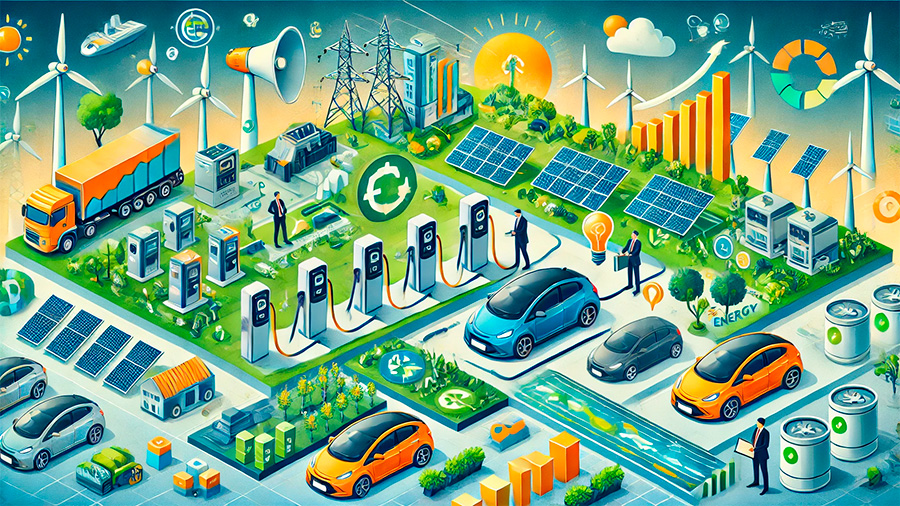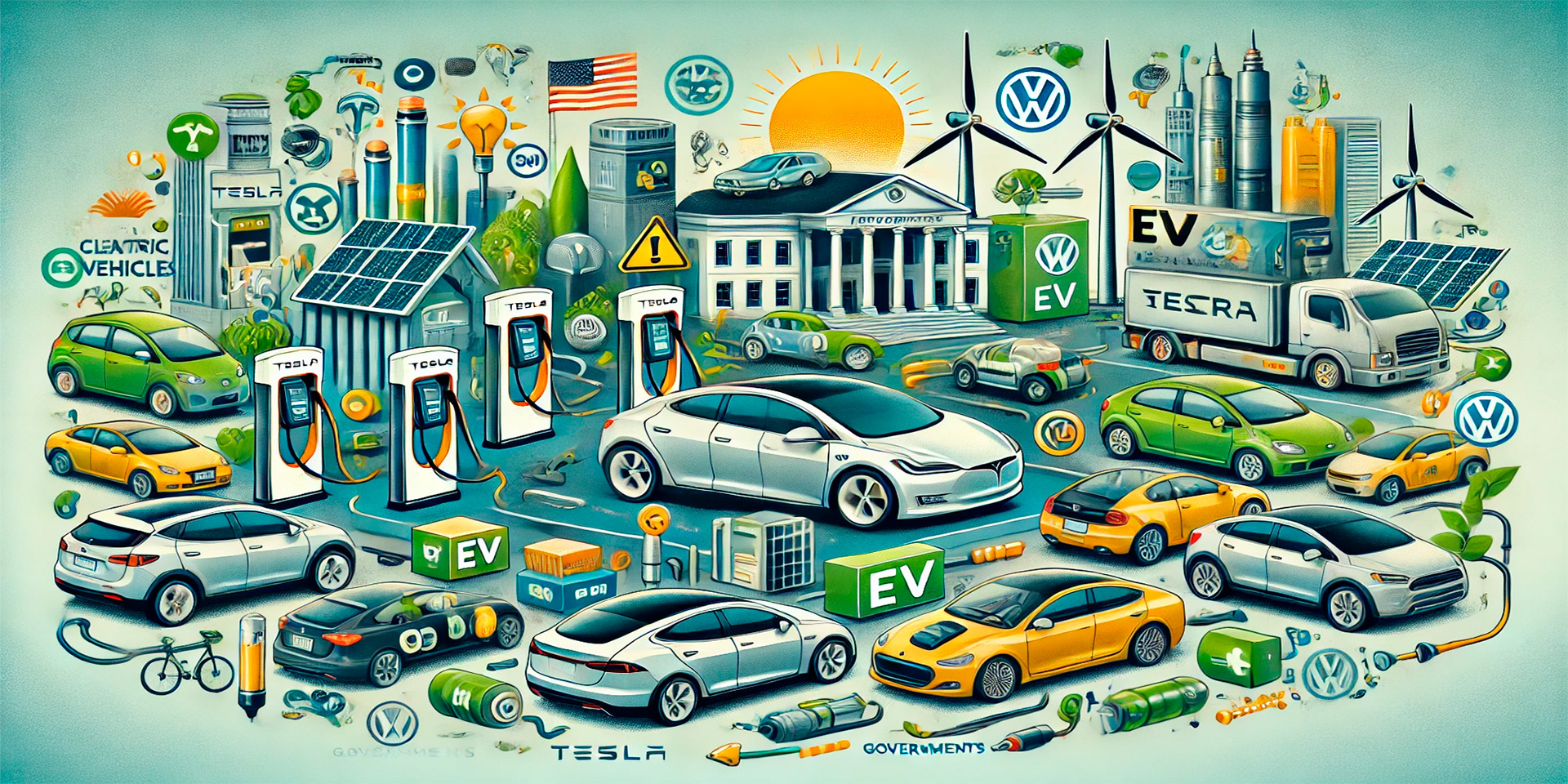The shift to electric vehicles (EVs) is transforming the global automotive industry. Governments, companies, and consumers are increasingly prioritizing sustainability and reducing carbon emissions, leading to a surge in demand for electric vehicles. As automakers transition away from traditional gasoline-powered cars, the EV sector is expected to experience significant growth in the coming years. For investors, this represents an exciting opportunity to capitalize on a transformative trend that will reshape transportation and energy infrastructure worldwide.
Why the EV Market Is Growing
- Government incentives and regulations: Many governments are introducing incentives such as tax breaks and subsidies for EV buyers, while imposing stricter emissions standards to phase out internal combustion engines.
- Advancements in technology: Improvements in battery technology and charging infrastructure are making electric vehicles more affordable and accessible for consumers.
- Corporate commitments: Major automakers like Tesla, General Motors, and Volkswagen are investing heavily in electric vehicle development, with many announcing plans to go fully electric within the next decade.
The global push toward clean energy and sustainability is driving the growth of the electric vehicle market, making it a promising sector for investors looking to profit from the shift.
Key Areas to Invest in the Electric Vehicle Sector
The electric vehicle ecosystem is vast and includes several key areas where investors can profit from the transition. From automakers to battery producers and charging infrastructure providers, there are multiple avenues to gain exposure to the growing EV market. Below are some of the top areas to consider for investment.

Investing in EV Automakers
One of the most direct ways to invest in the shift to electric vehicles is by buying shares in automakers that are leading the charge in EV production. Tesla is the most prominent name in the sector, but several other automakers, both established companies and startups, are investing heavily in EV production. Established automakers like General Motors (GM) and Ford are transitioning their fleets to electric, while newer companies like Rivian and Lucid Motors are offering innovative EV designs.
- Tesla: Tesla has dominated the EV market with its popular Model 3 and Model S vehicles. It remains the leader in EV production and innovation, particularly in autonomous driving technology.
- Legacy automakers: Companies like General Motors, Ford, and Volkswagen are rapidly expanding their EV offerings, positioning themselves to compete with Tesla and capture a significant share of the EV market.
- EV startups: New entrants like Rivian and Lucid Motors are attracting attention with advanced technology and sleek designs, providing additional opportunities for investors looking to capitalize on the EV trend.
Investing in EV automakers can provide substantial growth opportunities as demand for electric cars continues to increase worldwide.
Battery Technology: The Power Behind Electric Vehicles
- Lithium-ion battery manufacturers: Companies like Panasonic, CATL, and LG Chem are major players in the production of lithium-ion batteries for electric vehicles. As demand for EVs grows, these companies are expected to see increased production and profitability.
- Emerging battery technologies: Solid-state batteries, which promise faster charging and longer lifespans than lithium-ion batteries, are being developed by companies like QuantumScape and Solid Power. These technologies have the potential to revolutionize the EV market.
Battery technology is critical to the success of electric vehicles, as it determines the range, efficiency, and cost of EVs. The global race to develop more efficient and affordable batteries is fueling investment in companies that specialize in battery production and research.
Charging Infrastructure: Enabling the EV Transition
- Public charging networks: Companies like ChargePoint, EVgo, and Blink Charging are expanding their networks of public charging stations, aiming to make charging as convenient and widespread as refueling at gas stations.
- Home charging solutions: Companies such as Tesla, which offers its own home charging systems, and other providers like ClipperCreek, are catering to the growing demand for at-home EV charging solutions.
One of the key challenges to widespread EV adoption is the availability of charging infrastructure. As more consumers switch to electric vehicles, the need for a robust charging network becomes essential. Investing in companies that provide charging solutions, whether through building charging stations or developing home charging systems, can be a lucrative opportunity.

Renewable Energy and Electric Vehicles
The shift to electric vehicles is closely tied to the growth of renewable energy. As EVs become more popular, the demand for clean energy sources to power them will increase. This presents another opportunity for investors to profit from the transition by investing in renewable energy companies that are building the infrastructure needed to support the electric vehicle revolution.
Solar Energy and EV Charging
- Solar and EV integration: Solar energy companies are offering integrated solutions for homes and businesses, providing both solar panels and EV charging stations as part of a complete clean energy package.
- Solar-powered charging stations: Public charging networks are also exploring ways to use solar energy to power their stations, reducing their environmental impact and offering a greener alternative to traditional charging methods.
Solar energy is playing an increasingly important role in powering electric vehicles, both through public charging stations and residential setups. Many EV owners install solar panels to generate clean energy for their vehicles, reducing their reliance on grid electricity and lowering costs.
Utility Companies and Clean Energy Investments
- Clean energy utilities: Companies like NextEra Energy and Dominion Energy are leading the transition to renewable energy and are investing heavily in clean power generation to support the growing EV market.
- Electric grid modernization: As EV adoption increases, there will be a greater need for modernizing the electric grid to accommodate the increased demand for charging. Utilities that invest in upgrading their infrastructure stand to benefit from this trend.
Utility companies that are transitioning to clean energy sources, such as wind, solar, and hydroelectric power, will play a crucial role in powering the electric vehicle revolution. Investing in utility companies that are committed to renewable energy offers a way to profit from the shift to electric vehicles while supporting the broader clean energy transition.
Risks and Challenges in EV Investing
While the electric vehicle sector offers significant growth potential, there are risks and challenges that investors need to consider. The market is competitive, with both established automakers and new entrants vying for market share. Additionally, the success of EV companies is dependent on factors such as technological advancements, government regulations, and consumer adoption rates.
Technological and Regulatory Risks
- Technological advancements: The success of electric vehicle companies depends on ongoing advancements in battery technology, charging infrastructure, and autonomous driving systems. Companies that fail to innovate may fall behind their competitors.
- Regulatory environment: Government policies and regulations play a critical role in the adoption of electric vehicles. Changes in incentives or emissions standards could impact the profitability of EV companies.
Biotech companies’ success largely depends on the outcomes of clinical trials and the approval process from regulatory agencies such as the U.S. Food and Drug Administration (FDA). Clinical trials can be lengthy, expensive, and uncertain. Even promising drugs can fail to meet regulatory standards, causing sharp declines in stock prices.
Market Volatility and Competition
- Intense competition: Established automakers, EV startups, and tech giants are all competing for market share, creating uncertainty about which companies will emerge as long-term leaders.
- Market volatility: The EV sector can be volatile, with stock prices often influenced by news related to product launches, government regulations, and market demand.
The electric vehicle market is highly competitive, with a growing number of automakers and startups entering the space. While companies like Tesla have established a dominant position, newer players could disrupt the market, leading to increased volatility.
Final Thoughts: How to Capitalize on the Shift to Electric Vehicles
The electric vehicle revolution offers a unique opportunity for investors to profit from one of the most transformative shifts in the automotive industry. By investing in key areas such as EV automakers, battery technology, charging infrastructure, and renewable energy, you can gain exposure to a high-growth sector that is shaping the future of transportation.
However, it’s important to remain aware of the risks and challenges associated with EV investing. By diversifying your investments and staying informed about technological advancements and regulatory changes, you can position your portfolio to benefit from the ongoing shift to electric vehicles while managing potential risks.
As the world continues to prioritize sustainability and clean energy, the electric vehicle market is poised for significant growth, making it an exciting sector for investors seeking long-term opportunities.

